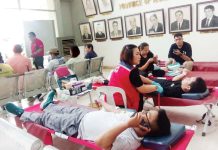
BY EDISON MARTE SICAD
MAYBE you are familiar with the question, “If you knew beforehand that you will not fail, will you do it then?”
This is often said to inspire people to do something that they have been hesitant to do because of the risks involve: the (many) possibilities of failing. To some extent, such a question can spark a new surge of energy or rekindle that hope that was immobilized by the fear of failure.
But then, the question seems to be giving false promises; and in the long run could lead to self-inflicted disappointments and depression. What if we reverse the focus of the question: “If you knew beforehand that you will fail, will you still do it?”
Why change the challenge of the former question? Because this, in my opinion, will make a person more courageous and independent. And in a deeper perspective, to suffer for a noble cause is what gives meaning to this god-forsaken existence.
In other words, no one has ever lived a life of 24/7 happiness (If you have, or know someone who does, please tell me).
“Being naughty is nice.”
Such a statement may run counter to a “good student-life” expectation. However, “being bad in school” can be heartily remembered and discussed (again and again) in school reunions. Ironically, in hindsight, the doing of bad things when you were in high school will eventually become cherished memories that bring laughter to the gathering. Rarely is the statement “Do you remember the many hours we spent studying in the library? The librarian had a hard time convincing us to leave.” give any nostalgic effect of a good high school life. No. no. This is too serious for recollection purposes; it sounds arrogant, even.
But how about this one:
“Do you remember when you told your parents that we will have a group study for an exam? And all we did was watch TV, gossip about teachers and classmates, and eat junk food? Then during the exam, we just copied the answer of our seatmate. And we even got a higher score than her!”
==============
I finished high school with no academic distinction or awards. And for some unknown reason, I felt disappointed. I believed I could have done better and somehow could have received some medals. No one in the family really expected me to be an achiever. But during my high school graduation, I felt that I did not make the most of the opportunities then. Too late.
Then I set my eyes for my college graduation. In short, I became an achiever to the surprised of everyone, especially one of my elementary teachers. She eventually said that I am a late bloomer (I think this word is a misnomer).
“In the fixed mindset, everything is about the outcome. If you fail, or if you’re not the best—it’s all been wasted. The growth mindset allows people to value what they’re doing regardless of the outcome. They’re tackling problems, charting new courses, working on important issues. Maybe they haven’t found the cure for cancer, but the search was deeply meaningful.” –Carol Dweck
Some ideas I learned from reading books:
1. The enemy of the best is the good.
At first, I find this saying non-inspirational. Then upon further thought, I realized I was wrong. Just to digress, being wrong or admitting that I were at fault all along was one of the best learning experiences I had.
I admit this is where my problem lies. I cannot focus with one task until it is done. I tend to jump from one activity to the next. I would also do this in my reading of books. I would read one chapter from one book then get another book and also read one chapter. Desultory, that’s the word.
2. You are with your brain 24/7, all alone.
Today, some students are with their phones 24/7. And if you take the phone away, and make them listen and think for hours, their brain will shut down. A constant interaction with dopamine-filled feedback in a passive stance among the youth—and even adults—can lead to depression.
With the limitless and instant stimuli given by scrolling and clicking, the brain gets overwhelmed, and, in a way, the person gets overdosed: his senses absorb all sorts of human experiences and ideas vicariously. It is more than just indigestion; it is already poisoning. In short, the (ab)use of gadgets poisons the mind and heart.
3. Have self-esteem and self-confidence.
This is not anymore about motivation. This is about self-discipline or good habits. Good feelings can only get you at the starting line. It is the doing despite the hardship that will carry you to the finish line. Tiredness and difficulty, when aimed towards something noble—your personal legend—become the buildings-blocks of true success./PN







